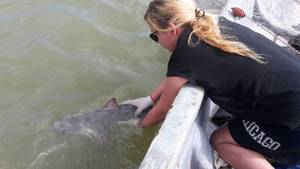Kerstin B.J. Glaus
 I hold a B.Sc. in Biology and a M.Sc. in Sustainable Development both from the University of Basel, Switzerland. In early 2016 a started my Phd in Marine Science at the University of the South Pacific in Fiji, focusing on bull sharks (Carcharhinus leucas).
I hold a B.Sc. in Biology and a M.Sc. in Sustainable Development both from the University of Basel, Switzerland. In early 2016 a started my Phd in Marine Science at the University of the South Pacific in Fiji, focusing on bull sharks (Carcharhinus leucas).
Current Research
Detecting population genetic structure in marine organisms using different types of molecular markers becomes increasingly important in fields ranging from evolutionary biology to species conservation management. Also, the application of whole genome-scans for non-model organisms allows genetic studies to enter a vast new stage of exploration. Previous studies delineated weak genetic population structuring in some pelagic sharks, whereas fine-scale genetic structuring has been recorded in sharks using coastal habitats as breeding grounds. Hence, the population genetic structure may be a result of complex species-habitat interactions that limit dispersal and lower gene flow, leading to a smaller degree in connectivity than expected based on the species range distribution. The bull shark (Carcharhinus leucas) is a large, mobile, coastal top predator. This circumglobally distributed shark is known to occupy a variety of habitats. Little is known about the population genetic structure of the bull shark, especially when it comes to remote island archipelagos. My PhD is focusing on several aspects related to bull shark population(s) in Fiji. Namely, I am trying to answer questions such as: Are bull sharks panmictic throughout the species’ Indo-Pacific range? What contemporary levels of gene flow can be detected between bull sharks from Fiji and other Pacific Islands or Australia? May bull sharks from Fiji be genetically distinct due to spatial isolation or past historic events? Furthermore, I am trying to identify nursery areas and parturition sites for bull sharks throughout Fiji’s main island Viti Levu. Also, I am assessing the current levels and underlying reasons for non-target shark catches in Fiji’s small-scale and artisanal fisheries. Hence, my PhD project incorporates a variety of different methologies ranging from the application of Single Nucleotide Polymorphisms (SNPs), to juvenile bull shark PIT-tagging in riverine systems, and semi-directive interviews with local fishermen.